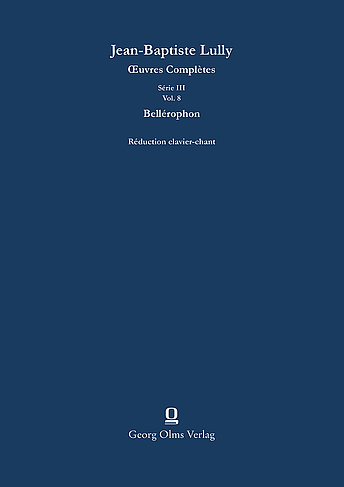Schneider | Krieger
Bellérophon. Tragédie
ISBN 978-3-487-16235-5
englischBorn in Florence, Jean-Baptiste Lully (1632-1687) is the most important French composer of the 17th century, whose influence in Europe on composers such as Purcell, Bach and Handel was considerable. With his 15 operas, most of whose libretti were written by Philippe Quinault, and in the case of Bellérophon, Thomas Corneille, he created a model for French musical theater that continues to resonate into the 20th century. As a dancer and composer, he entered the service of Louis XIV in 1653, the most powerful monarch of the era, for whose festivities he created "Ballets de cour" and, together with Molière, his famous "Comédies-ballets". Among his church music works, the Te Deum, the Miserere and the De profundis stand out.
The first historical-critical complete edition is presented here, based on the evaluation of all surviving sources and intended to facilitate the practical and scholarly study of Lully's work. Therefore, in addition to the orchestral score, which will also include a libretto print, the performance material and a piano reduction of the dramatic and church music works will appear.
"In terms of philological standards, the edition unquestionably meets the very highest standards. Multilingual introductions provide exhaustive information on the history of composition and first performances, as well as on the conditions of stage presentation; noteworthy are the notes on presumed performance practice, discreet as they are, yet very knowledgeable. The presentation of the volumes, especially of the music part, is perfect and leaves nothing to be desired, neither editorially nor typographically."
(Michael Heinemann, Editions in Criticism IV)
Der in Florenz geborene Jean-Baptiste Lully (1632-1687) ist der bedeutendste französische Komponist des 17. Jahrhunderts, dessen Einfluss in Europa auf Komponisten wie Purcell, Bach und Händel beträchtlich war. Mit seinen 15 Opern, deren meiste Libretti Philippe Quinault schrieb, im Falle von Bellérophon Thomas Corneille, schuf er ein bis ins 20. Jahrhundert nachwirkendes Modell für das französische Musiktheater. Als Tänzer und Komponist trat er 1653 in den Dienst Ludwigs des XIV., des mächtigsten Monarchen der Epoche, für dessen Feste er „Ballets de cour“ und zusammen mit Molière seine berühmten „Comédies-ballets“ schuf. Unter seinen kirchenmusikalischen Werken ragen das Te Deum, das Miserere und das De profundis heraus.
Hier wird die erste historisch-kritische Gesamtausgabe vorgelegt, die auf der Auswertung sämtlicher überlieferter Quellen basiert und die praktische und wissenschaftliche Beschäftigung mit dem Werk Lullys ermöglichen soll. Deshalb wird neben der Orchesterpartitur, die auch einen Librettodruck enthalten wird, das Aufführungsmaterial und ein Klavierauszug der dramatischen und kirchenmusikalischen Werke erscheinen.
„Hinsichtlich des philologischen Standards genügt die Edition fraglos allerhöchsten Ansprüchen. Mehrsprachige Einführungen bieten erschöpfende Informationen über Entstehungsgeschichte und erste Aufführungen, sowie zu den Bedingungen der Bühnenpräsentation; hervorzuheben die wie diskreten, doch sehr kenntnisreiche Hinweise zur mutmaßlichen Aufführungspraxis. Die Präsentation der Bände, insbesondere des Notenteils, ist perfekt und lässt weder in editorischer noch typographischer Hinsicht irgendwelche Wünsche offen.“
(Michael Heinemann, Editionen in der Kritik IV)


